Page 2 of 564
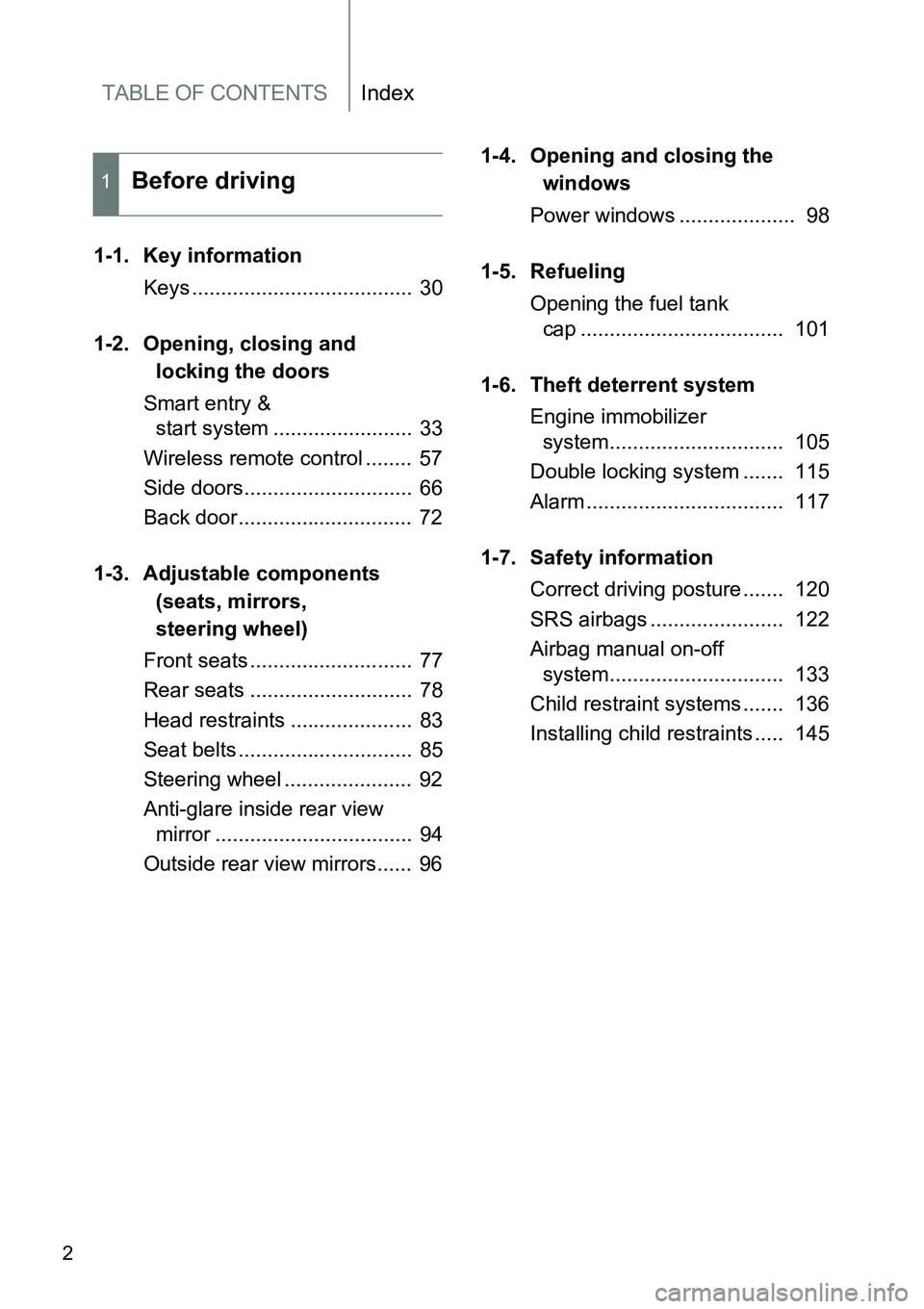
TABLE OF CONTENTSIndex
2
1-1. Key information
Keys ...................................... 30
1-2. Opening, closing and
locking the doors
Smart entry &
start system ........................ 33
Wireless remote control ........ 57
Side doors............................. 66
Back door.............................. 72
1-3. Adjustable components
(seats, mirrors,
steering wheel)
Front seats ............................ 77
Rear seats ............................ 78
Head restraints ..................... 83
Seat belts .............................. 85
Steering wheel ...................... 92
Anti-glare inside rear view
mirror .................................. 94
Outside rear view mirrors...... 961-4. Opening and closing the
windows
Power windows .................... 98
1-5. Refueling
Opening the fuel tank
cap ................................... 101
1-6. Theft deterrent system
Engine immobilizer
system.............................. 105
Double locking system ....... 115
Alarm .................................. 117
1-7. Safety information
Correct driving posture ....... 120
SRS airbags ....................... 122
Airbag manual on-off
system.............................. 133
Child restraint systems ....... 136
Installing child restraints ..... 145
1Before driving
Page 29 of 564
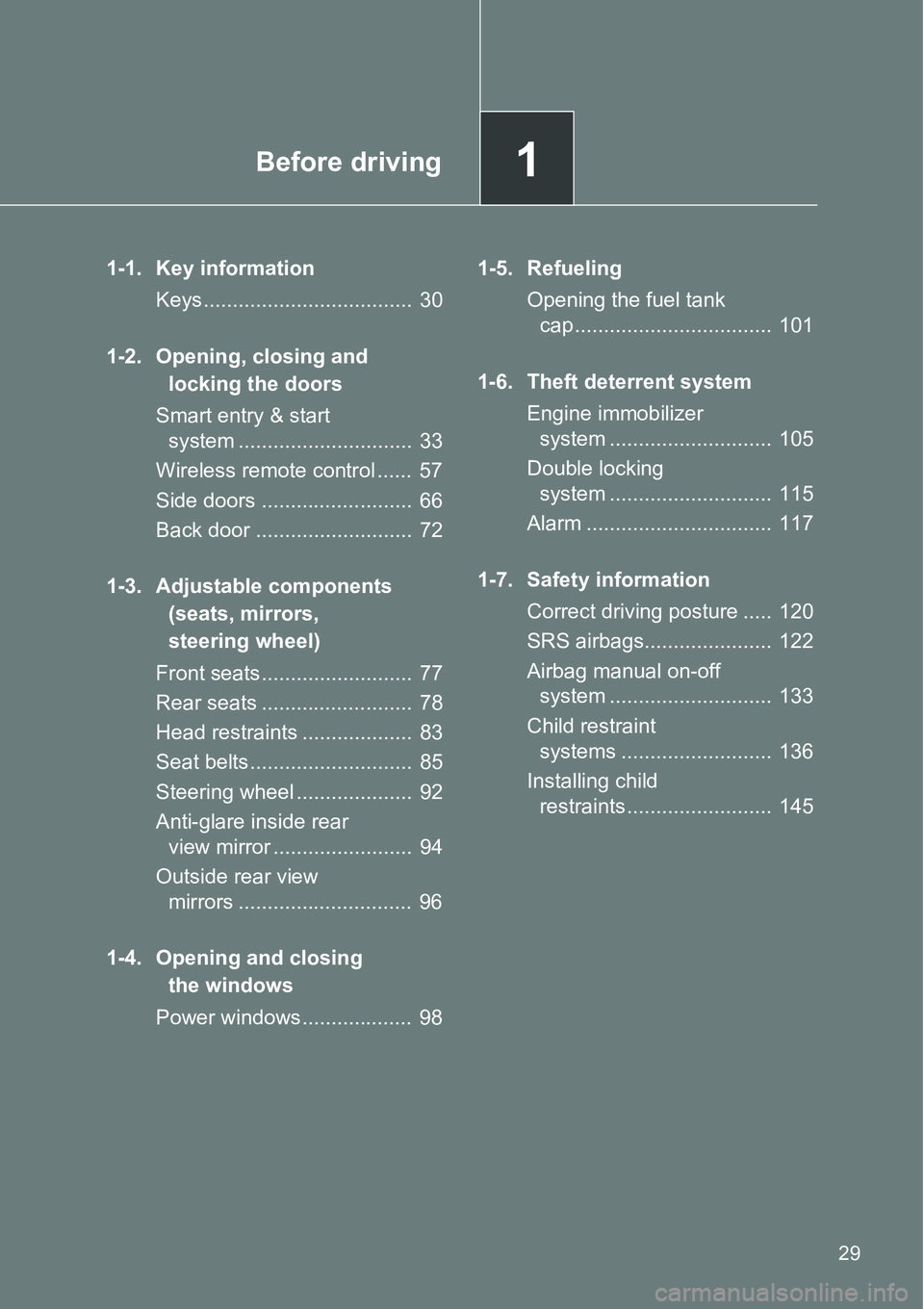
1Before driving
29
1-1. Key information
Keys.................................... 30
1-2. Opening, closing and
locking the doors
Smart entry & start
system .............................. 33
Wireless remote control ...... 57
Side doors .......................... 66
Back door ........................... 72
1-3. Adjustable components
(seats, mirrors,
steering wheel)
Front seats.......................... 77
Rear seats .......................... 78
Head restraints ................... 83
Seat belts............................ 85
Steering wheel .................... 92
Anti-glare inside rear
view mirror ........................ 94
Outside rear view
mirrors .............................. 96
1-4. Opening and closing
the windows
Power windows................... 981-5. Refueling
Opening the fuel tank
cap .................................. 101
1-6. Theft deterrent system
Engine immobilizer
system ............................ 105
Double locking
system ............................ 115
Alarm ................................ 117
1-7. Safety information
Correct driving posture ..... 120
SRS airbags...................... 122
Airbag manual on-off
system ............................ 133
Child restraint
systems .......................... 136
Installing child
restraints ......................... 145
Page 68 of 564
68 1-2. Opening, closing and locking the doors
Rear door child-protector lock
The door cannot be opened from
inside the vehicle when the lock
is set.
Unlock
Lock
These locks can be set to prevent
children from opening the rear
doors. Push down on each rear
door switch to lock both rear
doors.
Page 71 of 564
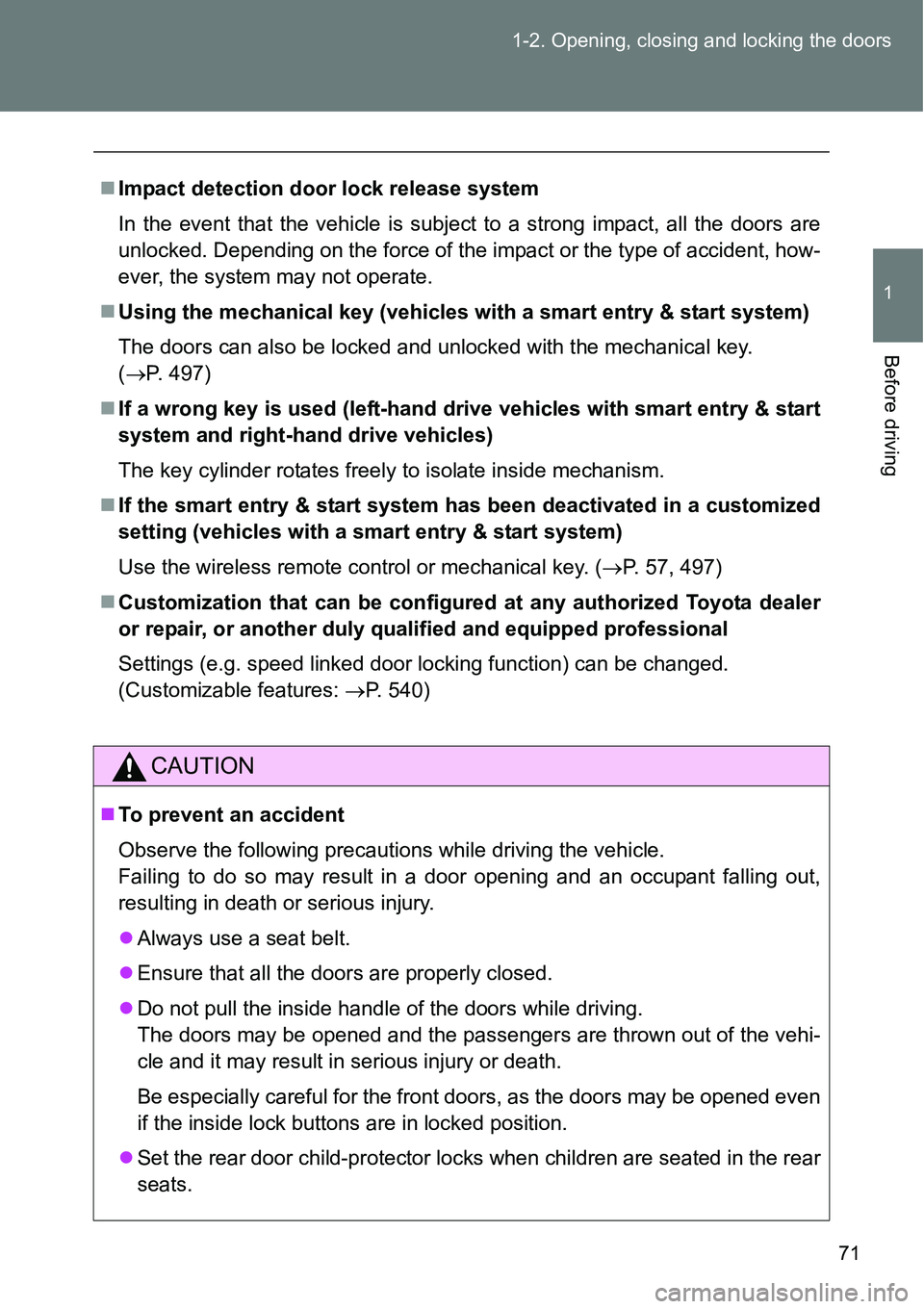
71 1-2. Opening, closing and locking the doors
1
Before driving
Impact detection door lock release system
In the event that the vehicle is subject to a strong impact, all the doors are
unlocked. Depending on the force of the impact or the type of accident, how-
ever, the system may not operate.
Using the mechanical key (vehicles with a smart entry & start system)
The doors can also be locked and unlocked with the mechanical key.
(P. 497)
If a wrong key is used (left-hand drive vehicles with smart entry & start
system and right-hand drive vehicles)
The key cylinder rotates freely to isolate inside mechanism.
If the smart entry & start system has been deactivated in a customized
setting (vehicles with a smart entry & start system)
Use the wireless remote control or mechanical key. (P. 57, 497)
Customization that can be configured at any authorized Toyota dealer
or repair, or another duly qualified and equipped professional
Settings (e.g. speed linked door locking function) can be changed.
(Customizable features: P. 540)
CAUTION
To prevent an accident
Observe the following precautions while driving the vehicle.
Failing to do so may result in a door opening and an occupant falling out,
resulting in death or serious injury.
Always use a seat belt.
Ensure that all the doors are properly closed.
Do not pull the inside handle of the doors while driving.
The doors may be opened and the passengers are thrown out of the vehi-
cle and it may result in serious injury or death.
Be especially careful for the front doors, as the doors may be opened even
if the inside lock buttons are in locked position.
Set the rear door child-protector locks when children are seated in the rear
seats.
Page 74 of 564
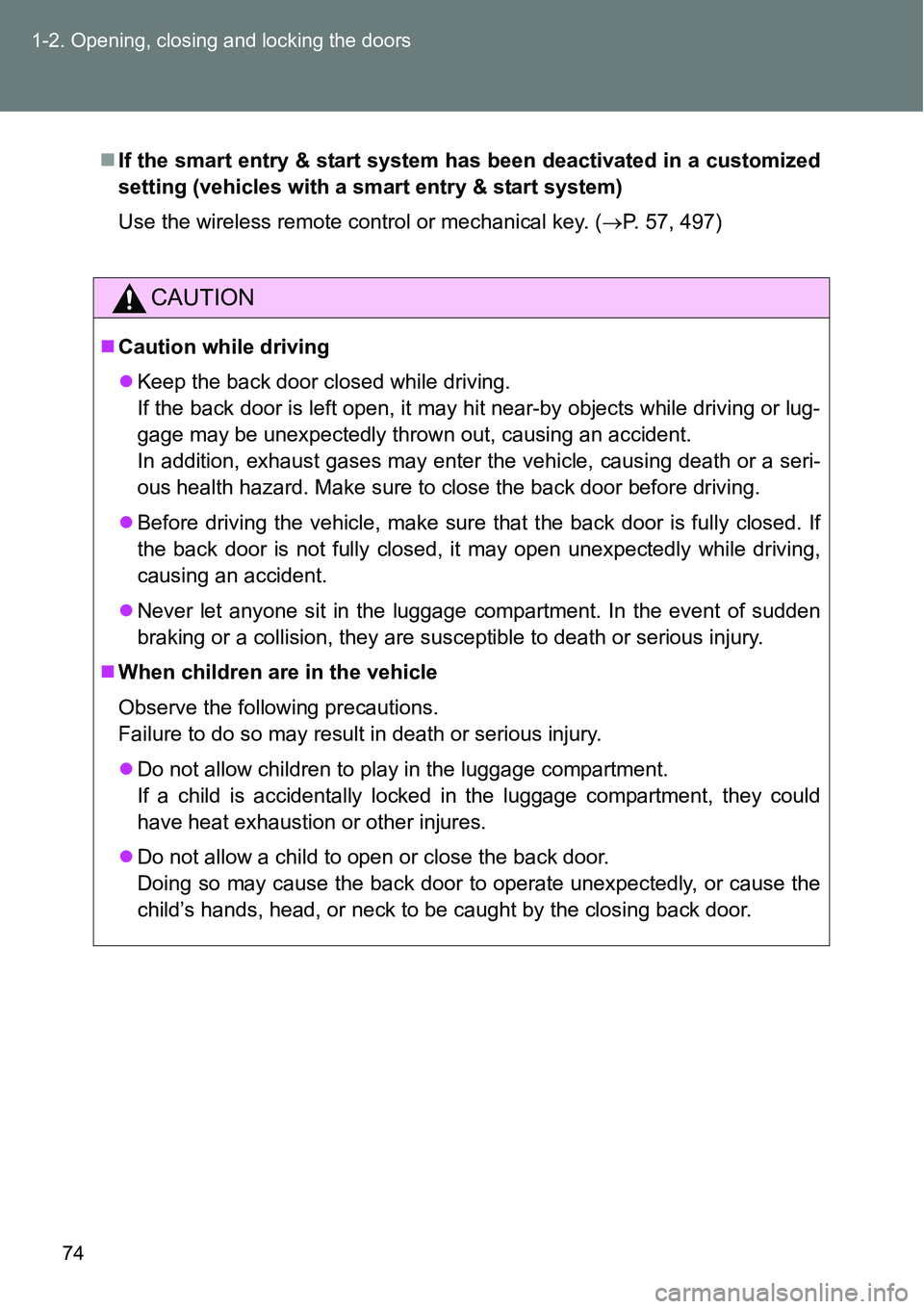
74 1-2. Opening, closing and locking the doors
If the smart entry & start system has been deactivated in a customized
setting (vehicles with a smart entry & start system)
Use the wireless remote control or mechanical key. (P. 57, 497)
CAUTION
Caution while driving
Keep the back door closed while driving.
If the back door is left open, it may hit near-by objects while driving or lug-
gage may be unexpectedly thrown out, causing an accident.
In addition, exhaust gases may enter the vehicle, causing death or a seri-
ous health hazard. Make sure to close the back door before driving.
Before driving the vehicle, make sure that the back door is fully closed. If
the back door is not fully closed, it may open unexpectedly while driving,
causing an accident.
Never let anyone sit in the luggage compartment. In the event of sudden
braking or a collision, they are susceptible to death or serious injury.
When children are in the vehicle
Observe the following precautions.
Failure to do so may result in death or serious injury.
Do not allow children to play in the luggage compartment.
If a child is accidentally locked in the luggage compartment, they could
have heat exhaustion or other injures.
Do not allow a child to open or close the back door.
Doing so may cause the back door to operate unexpectedly, or cause the
child’s hands, head, or neck to be caught by the closing back door.
Page 139 of 564
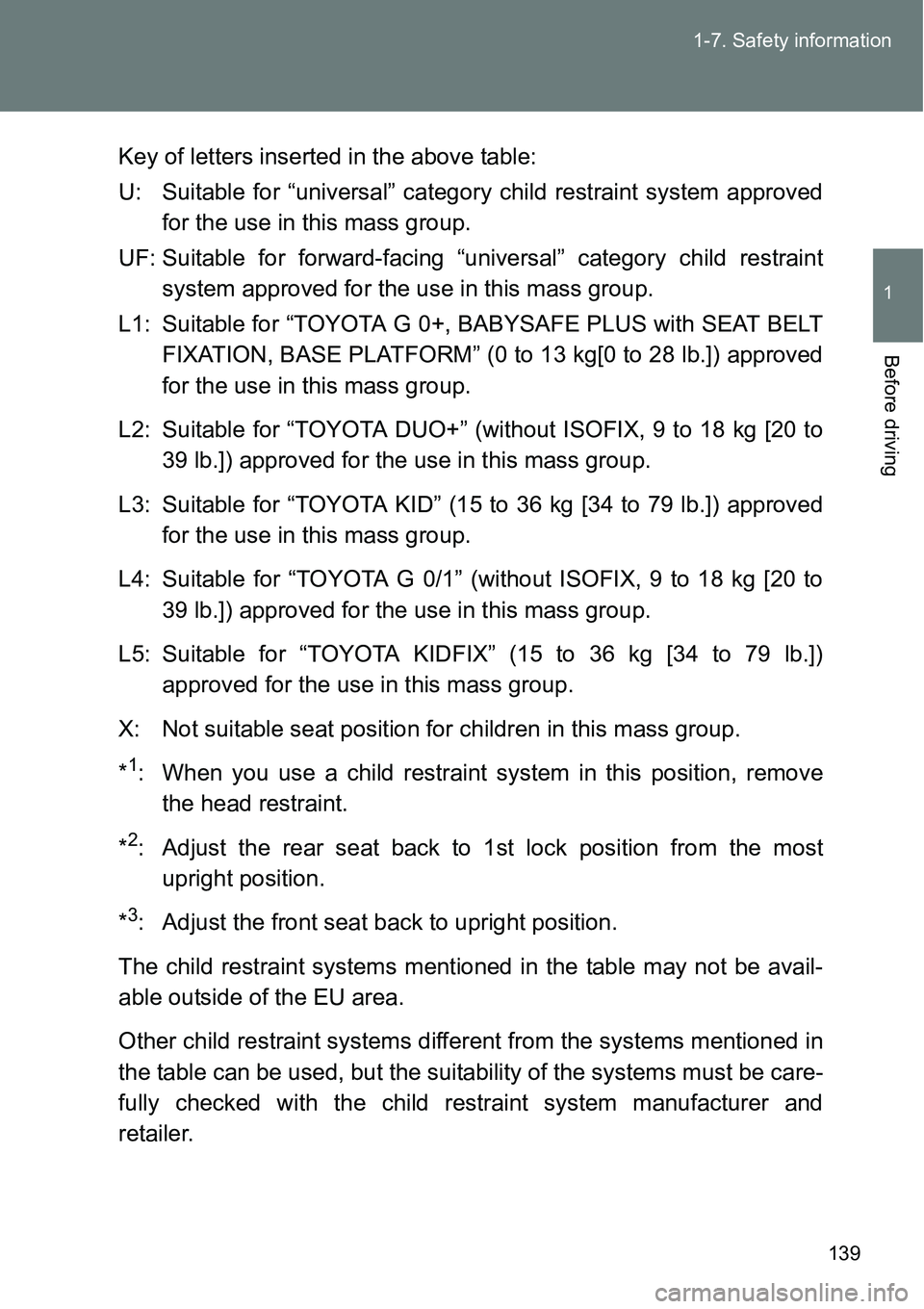
139 1-7. Safety information
1
Before driving
Key of letters inserted in the above table:
U: Suitable for “universal” category child restraint system approved
for the use in this mass group.
UF: Suitable for forward-facing “universal” category child restraint
system approved for the use in this mass group.
L1: Suitable for “TOYOTA G 0+, BABYSAFE PLUS with SEAT BELT
FIXATION, BASE PLATFORM” (0 to 13 kg[0 to 28 lb.]) approved
for the use in this mass group.
L2: Suitable for “TOYOTA DUO+” (without ISOFIX, 9 to 18 kg [20 to
39 lb.]) approved for the use in this mass group.
L3: Suitable for “TOYOTA KID” (15 to 36 kg [34 to 79 lb.]) approved
for the use in this mass group.
L4: Suitable for “TOYOTA G 0/1” (without ISOFIX, 9 to 18 kg [20 to
39 lb.]) approved for the use in this mass group.
L5: Suitable for “TOYOTA KIDFIX” (15 to 36 kg [34 to 79 lb.])
approved for the use in this mass group.
X: Not suitable seat position for children in this mass group.
*
1: When you use a child restraint system in this position, remove
the head restraint.
*
2: Adjust the rear seat back to 1st lock position from the most
upright position.
*
3: Adjust the front seat back to upright position.
The child restraint systems mentioned in the table may not be avail-
able outside of the EU area.
Other child restraint systems different from the systems mentioned in
the table can be used, but the suitability of the systems must be care-
fully checked with the child restraint system manufacturer and
retailer.
Page 141 of 564
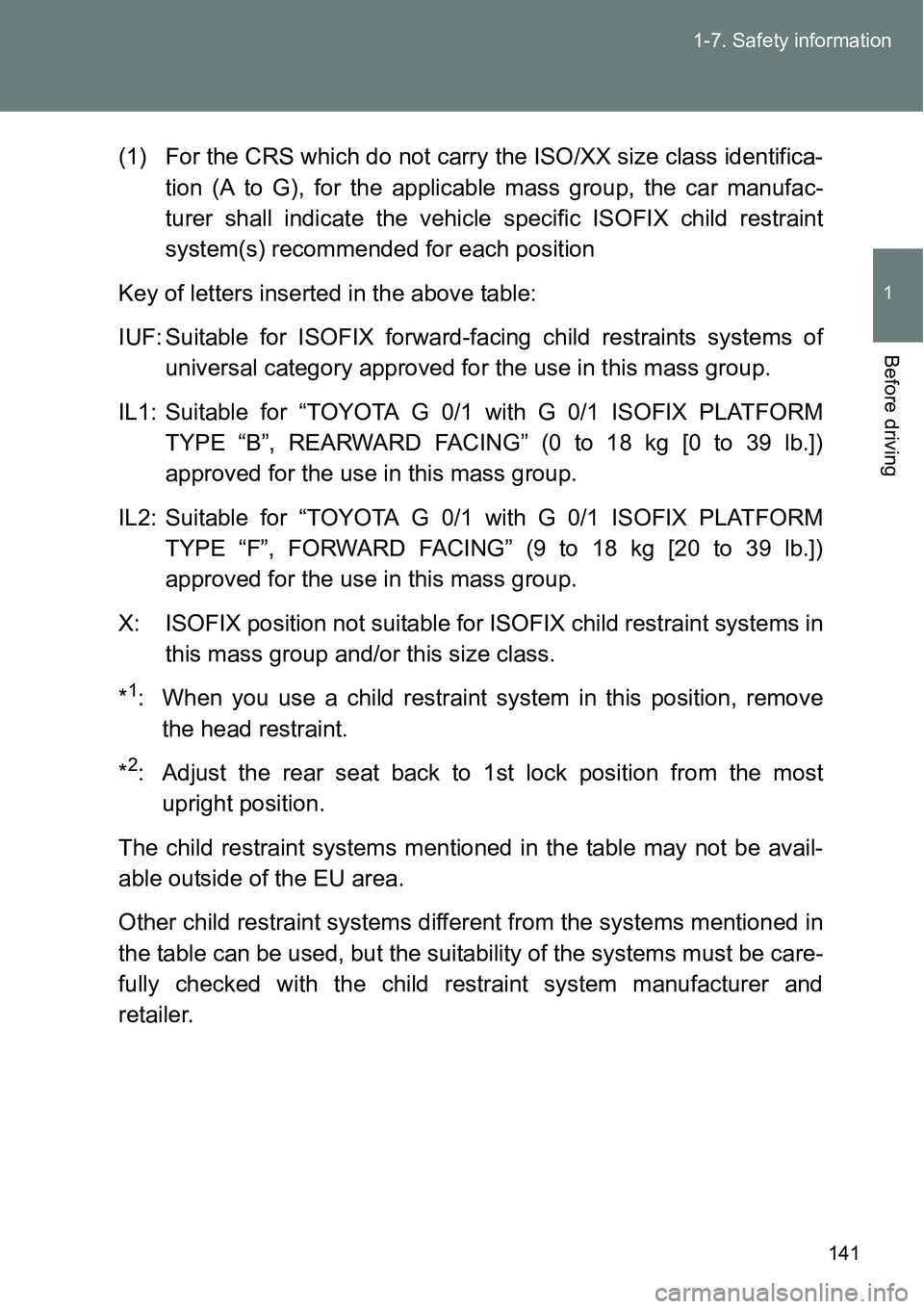
141 1-7. Safety information
1
Before driving
(1) For the CRS which do not carry the ISO/XX size class identifica-
tion (A to G), for the applicable mass group, the car manufac-
turer shall indicate the vehicle specific ISOFIX child restraint
system(s) recommended for each position
Key of letters inserted in the above table:
IUF: Suitable for ISOFIX forward-facing child restraints systems of
universal category approved for the use in this mass group.
IL1: Suitable for “TOYOTA G 0/1 with G 0/1 ISOFIX PLATFORM
TYPE “B”, REARWARD FACING” (0 to 18 kg [0 to 39 lb.])
approved for the use in this mass group.
IL2: Suitable for “TOYOTA G 0/1 with G 0/1 ISOFIX PLATFORM
TYPE “F”, FORWARD FACING” (9 to 18 kg [20 to 39 lb.])
approved for the use in this mass group.
X: ISOFIX position not suitable for ISOFIX child restraint systems in
this mass group and/or this size class.
*
1: When you use a child restraint system in this position, remove
the head restraint.
*
2: Adjust the rear seat back to 1st lock position from the most
upright position.
The child restraint systems mentioned in the table may not be avail-
able outside of the EU area.
Other child restraint systems different from the systems mentioned in
the table can be used, but the suitability of the systems must be care-
fully checked with the child restraint system manufacturer and
retailer.
Page 145 of 564
145
1
1-7. Safety information
Before driving
Installing child restraints
Follow the child restraint system manufacturer's instructions. Firmly
secure child restraints to the seats using a seat belt or ISOFIX rigid
anchors. Attach the top strap when installing a child restraint.
Seat belts (An ELR belt
requires a locking clip.)
ISOFIX rigid anchors (ISOFIX
child restraint system)
Lower anchors are provided for
the outer rear seats. (Tags dis-
playing the location of the
anchors are attached to the
seats.)
Anchor brackets (for the top
strap)
An anchor bracket is provided
for the outer rear seats.